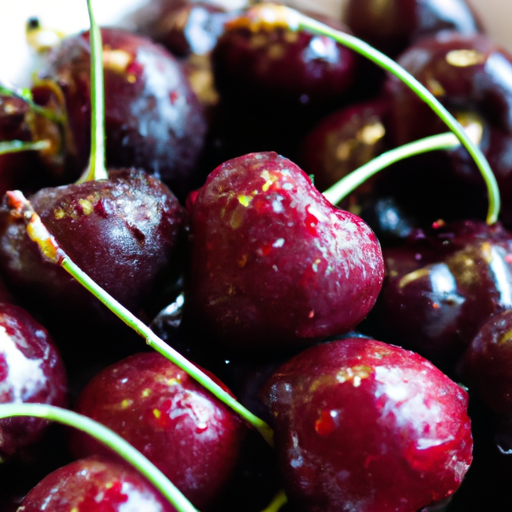The Enchanting Cherry: A Burst of Sweetness in Every Bite
Cherries - those delightful little fruits that evoke memories of warm summer days and indulgent desserts. They are not only visually appealing but also offer a burst of sweetness in every bite. In this blog post, we will explore the tantalizing taste, versatile uses, nutritional benefits, and some interesting facts about cherries.
The Taste of Cherries: Nature’s Sweet Pleasure
When you take a bite of a cherry, your taste buds are instantly greeted with a delightful explosion of sweetness. The flavor can range from mildly sweet to almost tangy, depending on the variety. Some cherries possess subtle tartness, which adds complexity and balance to their sweet profile. Every cherry is a small yet powerful package of flavors that captivate our senses.
Cherries in Cooking: From Sweet Treats to Savory Delights
Cherries lend themselves beautifully to both sweet and savory dishes. They are incredibly versatile and can be used in a myriad of culinary creations. Let’s explore some popular uses of this enchanting fruit:
1. Desserts and Baking
Cherries are renowned for starring in classic desserts like cherry pies, tarts, and crumbles. Their vibrant color and natural sweetness make them a highlight in cakes, muffins, and clafoutis. The tanginess of cherries also complements creamy desserts, such as ice creams and cheesecakes.
2. Preserves and Jams
Cherries have been cherished for centuries in the form of preserves, jams, and compotes. They are cooked down with sugar, enhancing their sweetness and creating a luscious spread to enjoy on toast, scones, or as a filling for pastries.
3. Sauces and Glazes
Cherries can be transformed into delectable sauces and glazes that pair beautifully with meat dishes. The natural tartness of cherries balances rich flavors and brings a burst of freshness, elevating dishes like roasted duck or grilled pork.
4. Salads and Salsas
Adding cherries to salads creates a delightful contrast of flavors and textures. Whether combined with salads featuring greens, grains, or cheeses, cherries offer a burst of sweetness, enhancing the overall taste and providing a touch of elegance. Cherries also shine in vibrant salsas alongside tomatoes, onions, and fresh herbs.
Nutritional Value: A Cherry on Top of Health
Apart from their enticing taste and culinary versatility, cherries bring a host of nutritional benefits to the table. Here are some notable facts about the nutritional composition of cherries:
- Cherries are low in calories and fat, making them a guilt-free indulgence.
- They are rich in dietary fiber, aiding in digestion and promoting satiety.
- Cherries are brimming with antioxidants, including anthocyanins, which are known for their anti-inflammatory properties.
- These delightful fruits are a natural source of vitamins A and C, promoting a healthy immune system and glowing skin.
Interesting Facts and History
Here are a few fascinating tidbits about cherries that might surprise you:
- Cherries have a long and illustrious history, dating back thousands of years. They were first cultivated in Western Asia and were highly valued by ancient civilizations, including the Greeks and Romans.
- The world-famous cherry blossom festivals in Japan celebrate the arrival of spring when cherry trees are adorned with beautiful pink and white flowers.
- Cherries are available in over one thousand varieties, with colors ranging from vibrant red to golden yellow. Each variety possesses its own unique flavor profile and uses in cooking.
- Michigan, in the United States, is often referred to as the “Cherry Capital,” as it produces 75% of tart cherries and 20% of sweet cherries in the country.
Conclusion
Cherries truly are a culinary treasure. With their enchanting taste, versatility in cooking, and impressive nutritional benefits, they deserve a prominent place in our kitchens. Whether enjoyed fresh from the tree or incorporated into exquisite desserts or savory dishes, cherries never fail to captivate our palates and bring sunshine to our plates. So indulge in the delightful world of cherries, and let their vibrant sweetness transport you to a world of flavor and joy.
Cherry
Origin: Cherries are believed to have originated in the region between the Black and Caspian Seas in Asia Minor, present-day Turkey. They were cultivated and consumed by ancient Greeks and Romans around 300 BCE and later spread to other parts of Europe through trade.
Common Uses: Cherries are commonly used in both sweet and savory dishes. They are popular in the baking world, used in pies, tarts, cakes, and pastries. Cherries are also commonly used in making jams, jellies, preserves, and sauces. In savory dishes, cherries can be used to make marinades, glazes, and compotes for pairing with meats or cheese.
Nutritional Benefits: Cherries are low in calories and fat, making them a healthy food choice. They are a good source of vitamin C, potassium, and dietary fiber. Cherries also contain antioxidants such as anthocyanins, which have potential health benefits, including reducing inflammation and protecting against certain chronic diseases.
Unique Properties: Cherries are known for their vibrant red color and sweet-tart flavor. They come in different varieties, including sweet cherries (Prunus avium) and sour or tart cherries (Prunus cerasus). Sour cherries are often used in cooking, as their tartness adds a distinctive flavor to dishes. Cherries also have a relatively short growing season and are often associated with the arrival of summer.
Historical Significance: Cherries have a long history and cultural significance. Ancient Greeks and Romans revered cherries and associated them with hospitality and celebration. In ancient Rome, cherries were often served at feasts and lavish banquets. Additionally, cherries have symbolized fertility and happiness in various cultures throughout history. Today, cherries are celebrated in seasonal festivals and are often enjoyed during cherry blossom season in regions such as Japan.




Use the share button below if you liked it.
It makes me smile, when I see it.